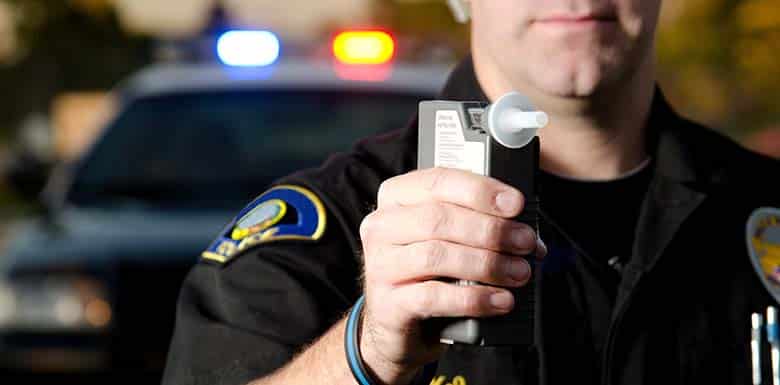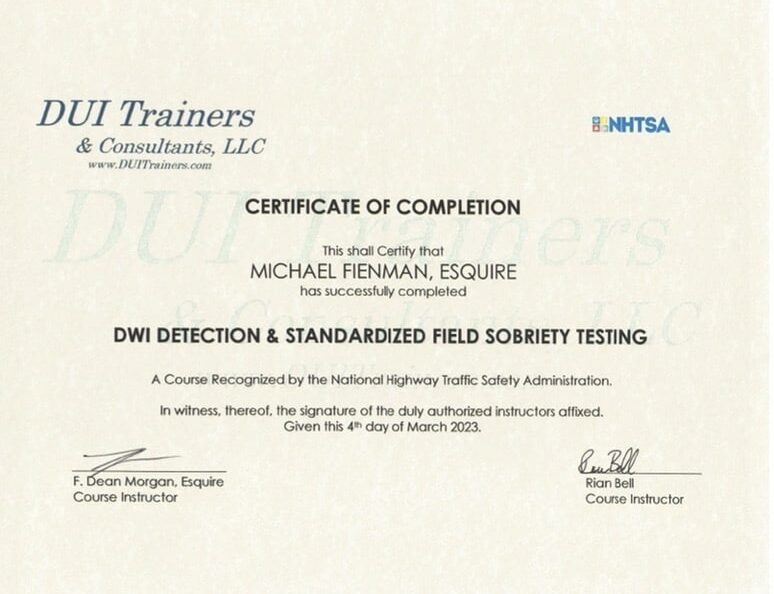The Many Benefits of SFTS Training for DUI Lawyers: Identify Weaknesses & Challenge Evidence
Mar 16 2023, by in DUI, Legal Blog
We’ve all seen dashcam footage or heard of someone pulled over for a DUI being asked to stand on one foot. And while we know these are called field sobriety tests, that’s usually where most peoples’ knowledge about DUI testing ends.
Many don’t realize these tests have been part of DUI enforcement since the 1980s and account for much of the evidence used in a DUI case.
Standardized Field Sobriety Tests are widely used by Pennsylvania law enforcement and throughout the county. The test results should be considered alongside other observations, such as the driver’s behavior, appearance, and speech, to determine if probable cause exists to make a DUI/DWI arrest.
However, field sobriety tests are not foolproof. Defense attorneys can challenge a test if they know where to look and how to articulate its flaws.
What are Standardized Field Sobriety Tests?
Standardized Field Sobriety Tests (SFSTs) are assessments used by law enforcement to determine whether a driver is impaired by alcohol or drugs. The tests are standardized because they are administered in a specific way, and the results are evaluated based on established criteria.
There are three generally accepted SFSTs:
The Horizontal Gaze Nystagmus (HGN)
The HGN test involves asking the driver to follow a moving object, such as a pen or flashlight, with their eyes. The officer is looking for involuntary eye movements, called nystagmus, which can indicate impairment.
The Walk & Turn
The Walk and Turn Test requires the driver to take nine steps forward, turn around, and take nine steps back, all while touching heel to toe and keeping their arms at their sides. The officer looks for signs of impairment, such as losing balance or stepping off the line.
The One Leg Stand Test
The One Leg Stand Test requires the driver to stand with one foot off the ground and count aloud until the officer tells them to stop. The officer looks for signs of impairment, such as swaying or putting the foot down.
The Criticisms of SFSTs
While these tests are a required part of DUI training for police, they are still conducted and interpreted by humans. Some common criticisms of field sobriety tests include:
- They Are Subjective: SFST results are often up to the interpretation of the administering officer. This can lead to false arrests and convictions and bias in favor of law enforcement.
- They Are Not All-Inclusive: SFSTs were designed for individuals not impaired by any medical condition or medication, including marijuana. They may not be appropriate or accurate for people with certain medical conditions or disabilities that affect their balance, coordination, or ability to follow instructions.
- Outside Variables Affect Performance: Even individuals who are not impaired can have difficulty performing the SFSTs due to anxiety, nervousness, fatigue, or physical limitations. This can lead to false positives and wrongful arrests.
- They Lack Transparency: SFSTs are not always administered clearly, and officers may not always explain the tests, their implications, or their results to the driver. This lack of transparency can lead to confusion, mistrust, and challenges in court.
- There Is a Culture & Language Bias: The SFSTs may be biased against individuals who are not native English speakers or from different cultural backgrounds. For example, the walk-and-turn test may be more difficult for individuals who did not grow up walking heel-to-toe, and the counting portion of the one-leg stand test may be more difficult for individuals who are not fluent in English.
Overall, SFSTs are not as reliable or fair as law enforcement would have you believe. That’s why they should only be used with other evidence and the officer’s observations.
Test Mistakes & False DUI Arrests
Since law enforcement widely administers these subjective DUI tests, it’s hard to calculate exactly how many drivers are falsely arrested. And while there is no one-size-fits-all solution, when tests are incorrectly administered or misinterpreted, it can lead to inappropriate DUI charges that significantly disrupt someone’s life.
When SFST mistakes occur and are identified early, it does provide an opportunity to attack the credibility of the test, the legitimacy of the evidence, and the DUI charges as a whole. The best way to evaluate the validity of a Field Sobriety Test is by working with a defense lawyer with the same training and certification level as the police officer who administered the test.
DUI Defense Attorneys Need SFST Training
In a typical DUI case, the arresting officer is certified to conduct and interpret Standardized Field Sobriety Tests via STFS training courses. Various organizations, such as The National Highway Traffic Safety Administration (NHTSA), offer these courses, and applicants are not restricted to police officers, state troopers, or members of law enforcement.
Criminal defense attorneys can take the SFST training too, and they should.
A DUI defense lawyer who can understand and scrutinize SFSTs is better equipped to call them into question. SFST training can help defense lawyers provide a more effective defense for their clients facing DUI/DWI charges. Here’s how.
What’s Covered by SFST Training?
Lawyers who wish to take SFST training may be required to meet certain prerequisites, such as having a valid law license or completing a certain number of Continuing Legal Education (CLE) credits.
The training must be conducted in person. It typically covers topics such as the science behind SFSTs, the proper administration of the tests, and strategies for challenging the evidence obtained through these tests.
The Benefits of SFST Training for Lawyers
A Standardized Field Sobriety Testing (SFST) training course can be highly beneficial for a defense lawyer for several reasons:
Better Understand DUI Procedures
A defense lawyer who has undergone SFST training will better understand law enforcement practices during a DUI traffic stop and subsequent investigation. For instance, if your lawyer knows the indicators of impaired driving when following a car, they can better respond to accusations that you crossed the center line or appeared glassy-eyed. This can help them identify potential weaknesses and formulate an effective defense.
Recognize Errors
SFST training can help a defense lawyer identify mistakes and oversights that may have occurred during the administration of the tests. These errors could be due to various factors such as the testing environment, the test administrator’s lack of training, or the individual being tested having a medical condition that affects their ability to perform the tests accurately. In some cases, these mistakes may be serious enough to undermine the accuracy of the test results, leading to a dismissal or reduction of charges.
Challenge DUI Evidence
Armed with the knowledge gained from SFST training, a skilled defense lawyer can effectively challenge the evidence presented by the prosecution, such as the results of the breathalyzer test or the field sobriety tests. This can weaken the prosecution’s case and potentially result in a more favorable outcome.
Negotiate DUI Pleas
A lesser-known but critical advantage of having the same level of DUI test training as the officer involved is the leverage it provides when negotiating with the prosecution. Even if the state’s evidence is strong, a lawyer with SFST training may be better equipped to secure a plea that reduces the severity of the charges or their penalties. This can be especially important in cases where a conviction could result in a complete loss of driving privileges or other significant consequences.
Junk Science or Not, Attorneys Should Stay Current
There’s no doubt that being stopped by the police can be an intimidating experience. Regardless of whether someone is impaired, a battery of roadside evaluations in all types of circumstances and environments can add a lot of pressure. People are bound to be nervous, and mistakes by the administrator and subject are bound to happen.
Just because you tripped or misunderstood a cop’s directions about following a light at 2:30 am doesn’t mean you were intoxicated.
These tests should be used as an investigative tool in conjunction with other information and evidence, but that doesn’t always happen. Outside variables might influence and flat-out botch an SFST result. The tests are not the singular way to assess intoxication, especially not to the point of making an arrest and severely impacting a person’s life.
Unfortunately, SFSTs are still widely administered and considered reliable by the police and, more importantly, the judges that preside over DUI cases. Despite all their flaws and biases, these tests are a mainstay of how people find themselves charged with drunk or drugged driving.
If you or a loved one are in this situation, find a DUI lawyer who can pick up on both the subtle mistakes and fundamental errors of these so-called “Standard” DUI tests. Attorneys with the same SFST certification as the investigators help give your argument regarding a test’s failings the same credence as the allegations against you.
Want an SFST-Trained Lawyer? Contact Fienman Defense
For years, Philadelphia DUI defense attorney Michael Fienman has set himself apart from other area defense lawyers. One crucial distinction is his extensive training in the procedures, administration, and interpretation of Standardized Field Sobriety Tests in Pennsylvania.
Armed with the same SFST certification provided to Pennsylvania law enforcement, attorney Fienman had studied the deficiencies related to field sobriety test guidelines and is well-practiced at challenging them when they aren’t correctly applied.
If your medical condition, a cop’s bias, or another outside factor influenced your DUI test and subsequent arrest, call attorney Fienman today at (215) 839-9529 for a free initial consultation. We’ll discuss what happened, evaluate possible DUI test errors, and explain your options.
Attorney Michael H. Fienman represents clients in criminal and traffic matters throughout Pennsylvania and New Jersey. Mr. Fienman has completed the same DWI detection training as most law enforcement officers and he holds a certificate in Standardized Field Sobriety Testing approved by the National Highway Traffic Safety Administration (NHTSA). As an experienced trial attorney, he is a zealous advocate known for relentlessly defending clients in state court, federal court, and before administrative agencies.
Attorney Fienman is licensed to practice before the Supreme Court of Pennsylvania, the Supreme Court of New Jersey, the US District Court for the District of New Jersey, and the US District Court for the Eastern District of Pennsylvania.



